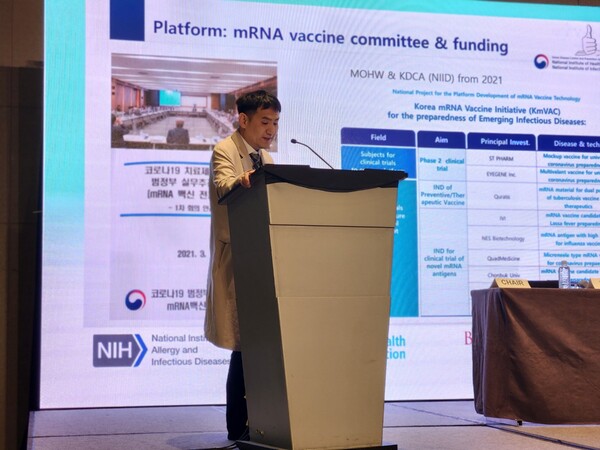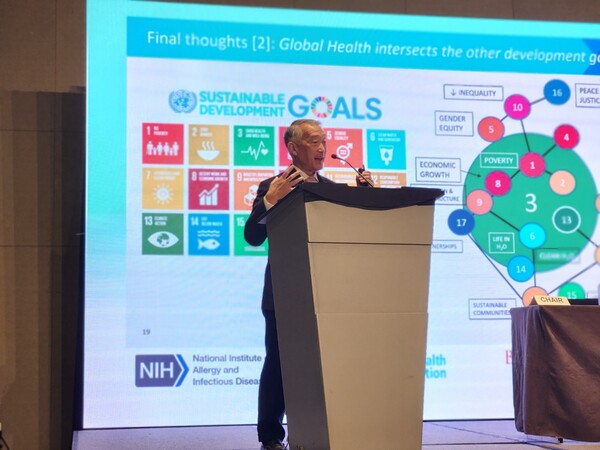Day two of the GVIRF conference kicked off with National Institute of Health Korea Acting Deputy Minister Jang Hee-chang unveiling a preview of Korea’s future pandemic preparedness strategy which will be published in April.
The NIHK is a research unit under the Korea Disease Control and Prevention Agency (KDCA).

“We will make efforts to reduce the current one-year development of monoclonal antibody treatments and vaccines to 200 days for new pathogens and 100 days for known pathogens,” he said.” “Before a pandemic, R&D cooperation must be conducted and clinical trial networks must be established to save time during the discovery of therapeutic and vaccine candidates.”
Referencing Celltrion's monoclonal antibody that stopped working for Omicron variants, he said two or more antibody combinations should be developed to avoid running into this problem in the future.
In this regard, he noted, “Based on the U.S. NIAID priming center, we also plan to build a Korean priming center to discover monoclonal antibody candidates in advance through the assessment of the immune status of infected people before a pandemic occurs.”
The prime center will be established near SK Bioscience’s factory in Andong, North Gyeongsang Province, he added.
He also outlined some priority areas in the plan, saying, “We will aim to develop vaccines and therapeutics for thrombocytopenia which represents one of the most critical viral diseases in Asia with an estimated fatality rate of up to 20 percent and still has no therapeutics or vaccines.”
Additionally, he announced cooperative research being conducted with the NIAID team via an agreement with Dr. Anthony Fauci to collaborate in several areas including monoclonal antibody therapeutics.
He further explained that the $0.7 billion dollars donated by Samsung Group to the Korean government for mounting better pandemic responses will be used to expand clinical research and clinical trial infrastructure and network.
Acknowledging the need to speed up Korea’s vaccine development, he mentioned the establishment of an mRNA committee in March 2021 and the Korea mRNA Vaccine Initiative (KmVAC) in January 2022. Consequently, there are already ongoing clinical trials and basic studies in addition to animal challenge tests for domestically developed mRNA vaccines which have high potential, he noted.
“Our institute is jointly developing an mRNA vaccine against the Severe Fever with Thrombocytopenia Syndrome (SFTS) with Moderna from 2022 whereby Moderna is responsible for the antigen and making the vaccine and we are responsible for conducting preclinical studies.”
Although he could not disclose detailed results, he shared that the vaccine’s ability to form neutralizing antibodies and cellular immunity in animals was excellent so far.
“We hope to start clinical trials in 2024 for this vaccine,” he stated optimistically.

Meanwhile, IVI Director General Dr. Jerome Kim emphasized the importance of data to effectively mount a pandemic response citing statistics from WHO’s ACT-Accelerator which estimates $7 billion to perform adequate diagnostics.
“Many governments made efforts to source vaccines, diagnostics, and therapeutics during the pandemic but coordinated responses were lacking,” he noted.
He stated that Korea stood out in this aspect and even recalled a tabletop exercise regarding a traveler with an unknown respiratory infection conducted in December 2019 which he argued helped prime Korea’s pandemic response.
Kim also commended CEPI’s 100-day mission as another way to prepare for future pandemics.
“Disease surveillance, regional hubs, regional manufacturing, and clinical trial networks are all related,” he pointed out, “Thus regional manufacturing should not be considered independently because we can't do an effective job in having sustainable regional manufacturing unless we have all the pieces together.”
Related articles
- [GVIRF 2023] New innovations in different vaccine platforms
- [GVIRF 2023] 'Vaccines should be deployed in 6 months in a new pandemic'
- 'Korea may need to spend over ₩2 trillion annually if Pfizer, Moderna increase Covid-19 vaccine price'
- Lancet report highlights ways to bolster lacking epidemic responses
- [GVIRF 2023] WHO, CEPI, AVMI say establishing regional manufacturing easy but sustaining it difficult
- [GVIRF 2023] The year 2023 is for RSV vaccines, says Johns Hopkins expert
- 'CEPI’s 100-day mission only a reality if we establish alternative clinical evidence now'

